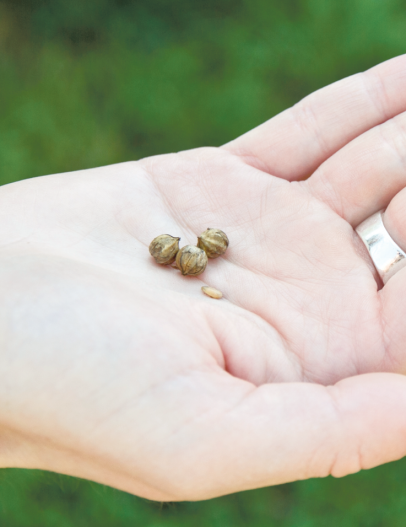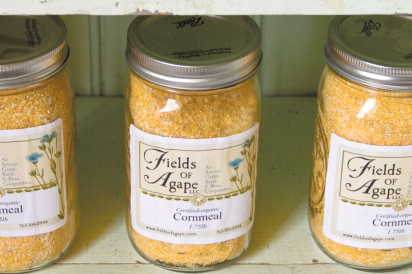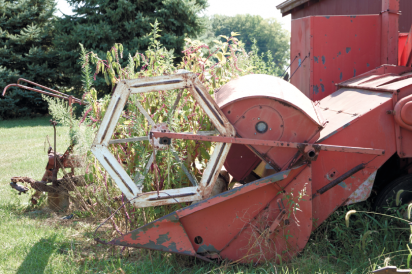Harmony With Land: Community Nourishes Fields of Agape
Anna Welch stands in the kitchen of her log house in rural Carthage, about 40 miles east of Indianapolis. Muffins, made with the organic wheat bran she grows, are in the oven.
Her back is to a large window above the kitchen sink, offering a view of fields and a white farmhouse next door – the home where she grew up and where her 90-year-old parents still live. "I'm called to be a farmer," Welch says confidently, pulling the muffins from the oven and setting them on the kitchen table. "It's something that makes sense to me."
Welch started Fields of Agape, a certified organic farm, to grow what she calls staples: grains, beans and seeds. Crops for this year include buckwheat, golden flax, black beans and cranberry beans. Fields of Agape is a cooperative farm, meaning that Welch has partnerships with farmers who share fields and equipment. Anna and her husband, Keith, are at the helm, planting and harvesting 60 acres of crops, then cleaning and packaging them to sell.
This farm, these particular crops, the meticulous way they are grown – this makes Fields of Agape a rare find in Indiana. Fields of Agape became certified organic in January, though Welch has been using organic growing methods from the start, in 2005. The certification is a feather in their cap – an affirmation of what they've been doing for the past seven years. Yes, they've been onto something special for quite some time, even without the organic label.
FIELD TO FORK
Fields of Agape is called out by name on the menu at Bloomington's Farm restaurant, where Chef Daniel Orr has nimbly paired the Welches' red beans with cumin-rubbed hanger steak.
Wheat berries (a grain), golden flax seed and popping corn from Fields of Agape fill the bulk bins at Pogue's Run Grocer in Indianapolis and at Bloomingfoods co-op grocery stores in Bloomington. And, the farm was enlisted by the nonprofit Farm Aid to contribute beans for a vegetarian chili served at some Super Bowl XLVI events in Indianapolis. Before Bloomingfoods stocked Fields of Agape, the grocer's staff visited the Welches to see how they farm, clean and store the food, says Ellen Michel, marketing and outreach manager for Bloomingfoods. "They're really pioneers," Michel says of the Welches. "Finding quality grains and beans and seeds in Indiana is challenging because we're mostly a corn and soybean state."
But that doesn't mean it's been easy for the Welches to get their food from field to fork.
"We sell no food locally," Welch says, referring to Carthage and other small communities nearby. "This area is very traditional in industrialized agriculture.
"If we didn't have the Bloomington and Indianapolis markets, we wouldn't be able to survive."
WHO'S WHO
That gap is the very reason that Fields of Agape is a co-op farm. Over time, our lifestyle has become disconnected from the land, Welch says.
She doesn't see Fields of Agape as just a farm that turns out crops. It's a way to partner with other growers and producers to develop and nurture a local food system, one that is connected and sustainable. Within Fields of Agape, that means creating a trusted co-op community. Judith Avery is one member. Avery comes from a traditional farming family, but supports the Welches' organic mission. She lends her personal land in nearby Henry County for the Welches to farm. This is where much of Field of Agape's crops are grown, and the Welches' land makes up the rest.
Another partner is Patty Reding of Langeland Farms, a family-owned and -operated farm in Greensburg. Reding is an associate grower who contributes popcorn and small red beans to Fields of Agape. Reding also offers up her large cleaning machines that can handle large batches of crops when the yields are too overwhelming for the Welches' smaller equipment.
Then there's Tim Shutt, owner of Hanover Grist Mill in Morrison. He grinds Fields of Agape's cornmeal and flour. And the Welches lease space at a historic lumber mill in Carthage, owned by Anna's sister, where they keep their grain cleaner, plus commercial kitchen equipment to package products.
"It never leaves our hands," Welch says of the food that travels through the co-op. "That's why the infrastructure is so important. Every time you let the product go somewhere else, you lose control of it. I want to ensure every part of the process."
FAMILY TIES
Welch's roots inspire the way she lives today. Outside the neighboring farmhouse that she can see from her kitchen window, Welch's parents, who were teachers, raised milk and beef cows, pigs and lamb when she was young. They were "totally sustainable," Welch says.
A 35-acre field that belongs to her parents sits between their house and the Welches' log cabin. Welch hopes to transition the field to an organic one this year to grow black beans and cranberry beans. They are poised to increase their production, but finding dependable skilled labor has been a problem. Keith has a full-time job and also works the fields. Meanwhile, Anna is full-time with Fields of Agape, and uses her background in finance and technology to handle the financial and business planning for the farm.
Welch started growing organic food for health reasons, and now the benefits of particular foods drive the crop list. For example, black beans are a good source of folic acid, which has been shown to prevent certain birth defects, and flaxseed is rich in omega-3, the same healthful fatty acids found in salmon that improve heart health.
The first two years that Anna and Keith Welch grew and harvested flax and small grains, they used this harvester, which is like a combine that runs behind a tractor.
GOING ORGANIC
When it came time to apply for organic certification, Welch felt prepared – she had been growing organically all along. For seven years, she documented her farming and made field maps. She adhered to rules on seeds, soil, water, natural pest and weed control, and never used chemicals.
Cissy Bowman, an organic certification consultant and owner of Center Valley Organics in Clayton, says Fields of Agape's operations prove that thousands of acres aren't necessary to be a successful grower. Bowman, a longtime figure in Indiana agriculture, says Welch is going "above and beyond with diversity of the crops and utilization of small space. That's smart farming."
Bowman says the farm stands out in Indiana for having an unusual collection of crops. In the upcoming growing season, Welch says she'll experiment with French blue lentils.
She'll start small, as she did one day in 2005 when she purchased heirloom seeds from a seed exchange. She planted a dozen 4- by 10-foot plots that would eventually become French blue lentils and garbanzo beans.
"It was a life-changing day," Welch says. "It rebirthed this love of agriculture in me."
Details: For a complete list of retailers and more info, visit www.fieldsofagape.com.







